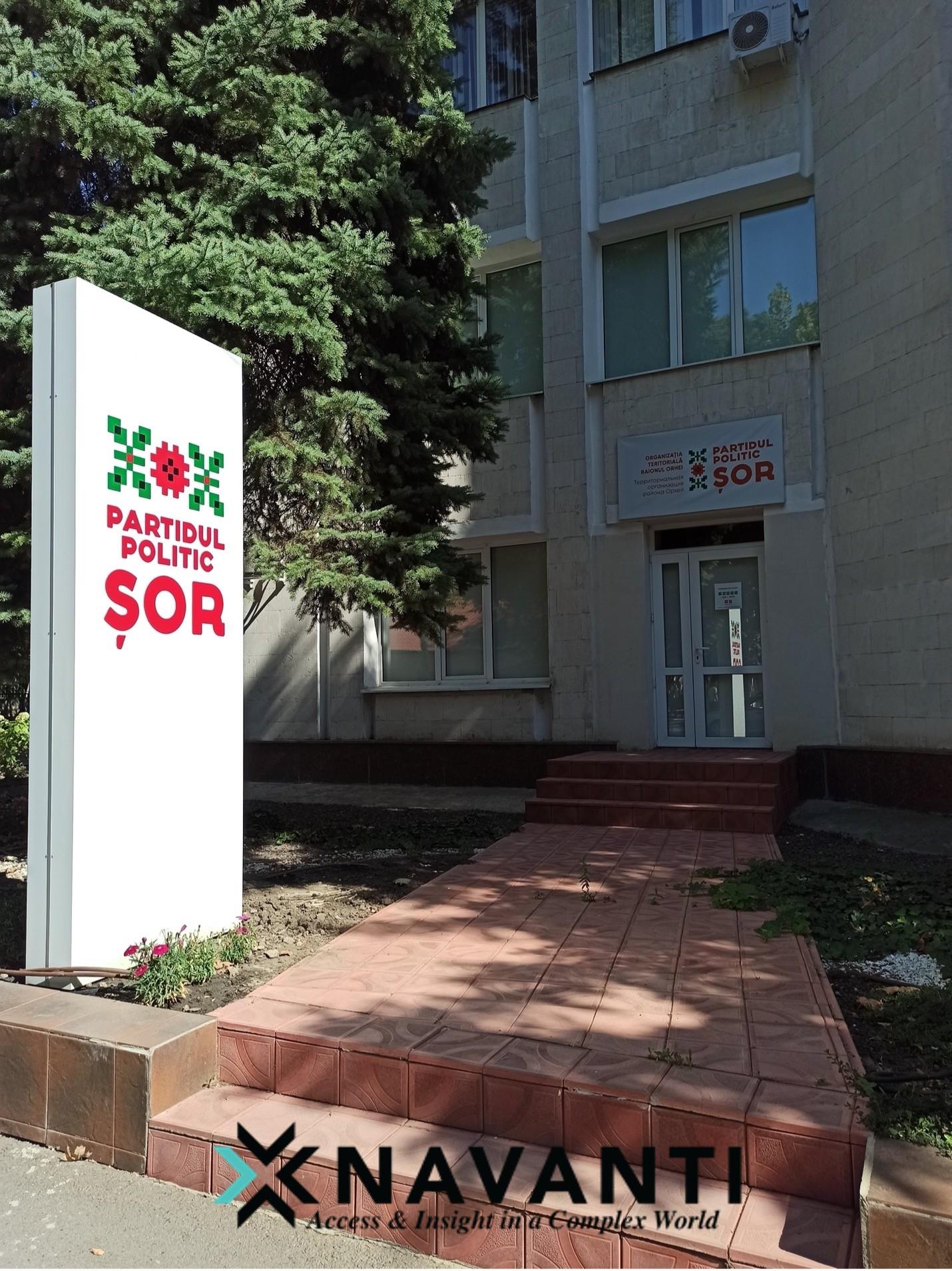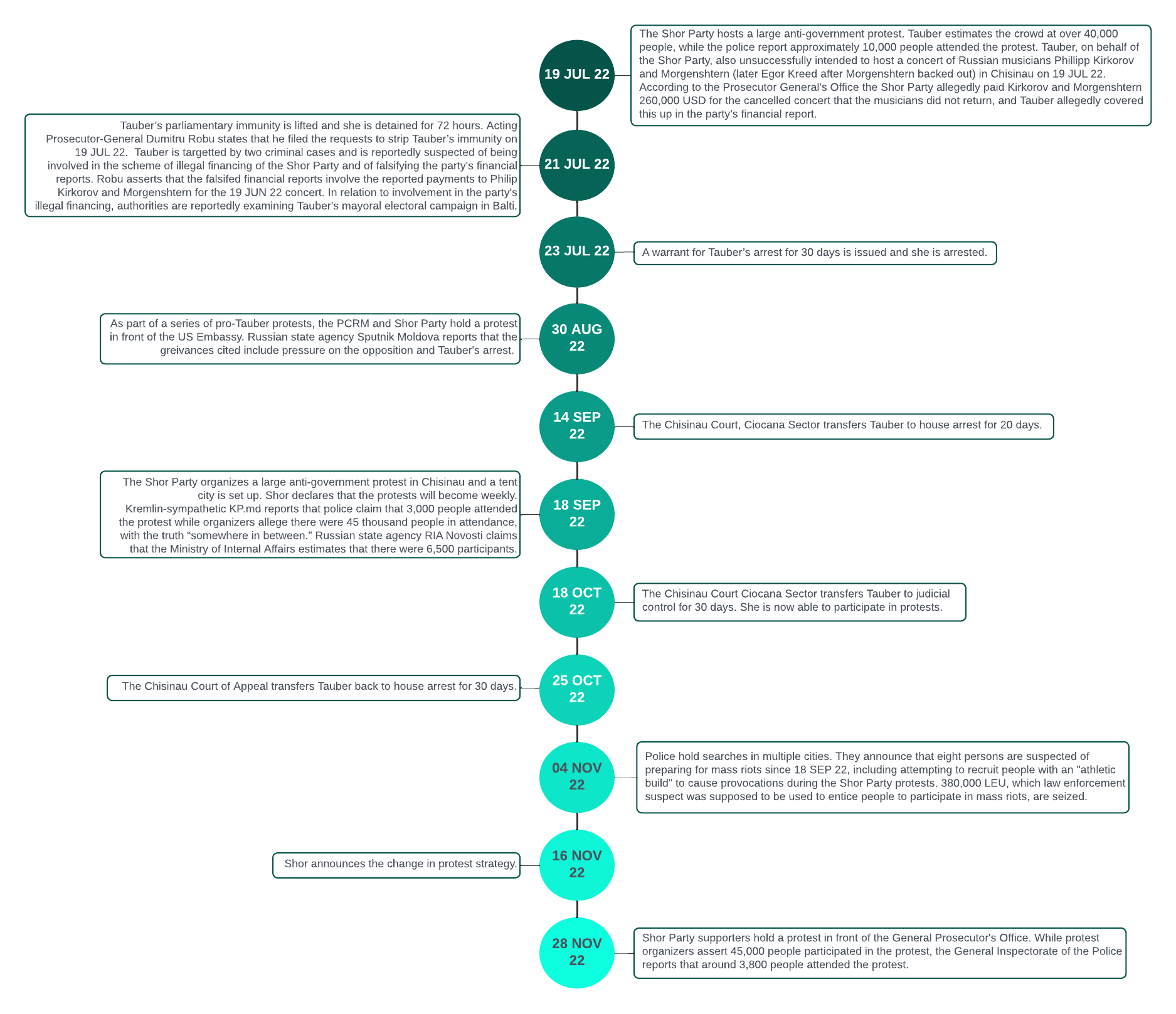Understanding the US-Sanctioned Shor Party in Moldova by Navanti News

Moldova in 2022 is facing turmoil both within and without: domestic political unrest, record high inflation, months-long protests, an unprecedented energy crisis and blackouts all occurring on the backdrop of Russia’s war in neighboring Ukraine. Amid this chaos, the Russia-sympathetic, populist Shor Party has sought to position itself as an alternative to Moldova’s ruling Western-aligned Party of Action and Solidarity (PAS). The leader of PAS, President Maia Sandu, is currently experiencing her lowest approval rating since taking office in December 2020. Over the past year, the Shor Party has come under intense scrutiny for its tactics and activities. In November 2022, Moldova’s cabinet of ministers approved a decision to investigate the constitutionality of the Shor Party because of its reported illegal financing and supposed relationship with Russian intelligence services, raising the possibility that the party could be banned in the near future. Indeed, the Shor Party and its leadership have reputations for having close ties to Russia and enriching themselves while hiding behind the cover of democracy. The Shor Party is led by recently US-sanctioned oligarch Ilan Shor, a dual citizen of Moldova and Israel, and a current member of Moldova’s Parliament. Notably, Shor has lived in exile in Israel since June 2019 when he illegally fled the country. He was detained in 2015 and in 2017 was sentenced to seven and a half years in prison for orchestrating a complex international money laundering scheme known as the “theft of a billion,” though the sentence was never finalized. Due to his physical absence in Moldova, Shor’s most visible party member is Marina Tauber, a vice president of the Shor Party since 2017, a parliament deputy since 2019, and the current secretary of the Shor Party parliamentary faction.
The Shor Party is part of Moldova’s Kremlin-sympathetic opposition. On 26 OCT 22, the Shor Party and the its runaway leader, Ilan Shor, were included in a list of nine individuals and 12 entities that were sanctioned by the US Treasury Department. While the sanctions tranche had two main vectors—Russia’s persistent malign influence campaigns and systemic corruption in Moldova—the US Treasury Department underlined the danger of their convergence, as the Kremlin utilizes corruption in its influence operations abroad. Indeed, the US Treasury Department asserted that Shor has received Russian support and that the Shor Party was attempting to cause political unrest in Moldova. In addition to Shor, the US Treasury Department also sanctioned his wife, Russian pop star Jasmin, who received an Honored Artist of Russia award from Russian President Putin in 2015. In the days following the sanctions’ announcement, several media outlets released reports that provided additional insight into the activities of the Russian Federal Security Service (FSB) in Moldova, particularly in relation to politics: The Washington Post published an article that cited intelligence documents provided by the Ukrainian special service and interviews with US, Moldovan, and Ukrainian officials while RISE Moldova and the Dossier Center conducted an investigation into the FSB’s interference. Both reports noted that the FSB’s strategy in Moldova has shifted away from its previous in-country partner—former Moldovan President Igor Dodon and the Party of Socialists (PSRM)—to now focus on Ilan Shor and the Shor Party.
Marina Tauber: Shor Party Star
The Shor Party has been compared to a clan—several prominent party members are linked to one another through close personal ties and the businesses and enterprises of Shor and his late father, Miron Shor. A key example of this is seen in Shor Party Vice President and Deputy Marina Tauber, whose political activities have been at the center of many of the Shor protests over the last year and given her highly visible role in the party and in parliament.
Tauber and Shor have a longstanding personal relationship, beginning when they were classmates at a private school founded by Shor’s father. According to Tauber, when her father passed away when she was 16, the Shor family helped Tauber’s family. Tauber has spoken about how she would never have pursued a political career if not for Shor. From 2011 to 2017, Tauber led the Tennis Federation of Moldova that received sponsorship from the Miron Shor Charitable Fund that is controlled by Ilan Shor. Prior to becoming a Shor Party VP, Tauber apparently had an organizational role in the early party-sponsored protests carried out by the party that expanded as she climbed the political ladder. In 2018 she became mayor of Jora de Mijloc in the Orhei district and then was elected to parliament as a deputy representing Ivancea in 2019. In November 2021, Tauber led an unsuccessful campaign for mayor of Balti, the second largest city in northern Moldova. Despite winning the greatest share of votes in the first round, she did not win more than half of all votes and the race entered a second round. However, the Central Election Committee excluded Tauber from the second-round ballot due to a failure to accurately report party expenses. This ignited a series of protests in Balti in support of Tauber and the Shor Party, while Russian media outlet Sputnik Moldova labeled Tauber’s ban a PAS “special operation” against the Shor Party.
Shor and Tauber are also connected in the financial scandal known as the “theft of a billion,” which reportedly involved Shor-tied companies gradually taking control of three banks (Banca de Economii [BEM], Unibank, and Banca Sociala) from 2012 to 2014 to allegedly issue huge loans to Shor-connected companies in November 2014. Tauber reportedly acquired a 4.6 percent stake in UniBank in 2012. Shor was arrested and charged with fraud in connection with the scandal. Tauber’s parliamentary immunity was lifted, a criminal investigation was opened to investigate her alleged involvement, and she was placed under house arrest. Ultimately, Tauber was not charged in the case. However, she was stripped of parliamentary immunity once again and arrested in July 2022, when she was charged with knowingly accepting illegal financing for the Shor Party from an organized crime group and falsifying the party’s financial report. She was detained for almost two months then released on house arrest in September 2022, before being placed under judicial control in October 2022. While Tauber’s ties to Shor are obvious, the extent of her ties to Russia are uncertain. According to public sources, Tauber’s ties to Russia are evident in her participation on the parliamentary committee “Friendship Group with the Russian Federation,” trips to Russia, and Russian congratulatory holiday social media posts.
It is Tauber who Shor trusts to lead the party while he works in exile in Israel. Shor may be the name and face of the party in Moldova, but the Shor Party would not function in its current capacity without Marina Tauber. When not under house arrest, Tauber is frequently present at Shor Party protests and events and appears to operate as the backbone of the party in parliament. Despite their close personal, financial, and political relationships, Tauber was not included in the US Treasury’s latest tranche of sanctions, leaving a huge gap for Shor to engage in nefarious activities via Tauber. Following the imposition of sanctions against Shor, the Security and Information Service (SIS) compiled a list of persons and companies with common business interests with him and another US-sanctioned Moldovan oligarch in exile, Vlad Plahotniuc. While the list of associates is secret, it is highly likely that Tauber falls on the list of Shor’s associates.
The Shor Party in Moldova’s Political Landscape
Even before the new US sanctions were announced, Kremlin-sympathetic opposition parties’ activities, including those of the Shor Party, had been grabbing headlines as they jockey to capitalize on domestic frustrations and grievances. At present, there are three opposition parties in the Moldovan Parliament: the Bloc of Communists and Socialists (BCS) that is composed of the PSRM and the Party of Communists (PCRM) and holds a combined 32 seats, and the Shor Party, which holds six seats. All three parties parrot similar Kremlin-friendly positions, including pressing for in-person appeals to Russian authorities to lower gas prices and remove an agricultural product embargo (PSRM, PCRM/Shor). However, fault lines exist amongst the three parties, illuminated by disjointed attempts to hold anti-government protests.
While the Shor Party has in large part become the face of the ongoing anti-government protests, the current wave of protests actually traces back to the PCRM, which initially called opposition parties to join in a series of anti-government protests that the BCS planned to hold. The Shor Party swiftly announced that it would join the PCRM to protest, while the PSRM backed away to hold its own, separate protests. The Shor Party’s dominance over the protest scene strengthened during the summer around the time of Tauber’s arrest, with demands for her release becoming one of the protests’ rallying cries. Ilan Shor’s decision in September 2022 to hold large protests every Sunday helped solidify the Shor Party’s public exposure. On 16 NOV 22, Shor announced that the Shor Party was changing strategies with its protests, moving away from general anti-government protests to focus on “dismantling” legal institutions, namely the Prosecutor General’s Office and the Constitutional Court. The Shor Party has been accused of paying protesters for their involvement in their protests, with allegations that certain actors sought to incite “mass riots” during the Shor Party protests.
The Shor Party’s dominance over anti-government protests has proven controversial within the opposition, with the PSRM pointedly avoiding participating. While the PCRM has at times undertaken joint efforts with the Shor Party, including anti-government protests and trips to Russia, PCRM leadership appears unwilling to whole-heartedly tie the party to Shor’s. On their part, Shor Party leadership has criticized the PSRM’s refusal to participate in the Shor-led protests. On 18 NOV 22, former President Dodon, who faces multiple charges including the illegal financing of the PSRM and treason, was released from house arrest. Shortly after his release, Dodon vowed that he will “never” attend protests held by the Shor Party, further fracturing ties between the pro-Kremlin opposition parties in Moldova.
Conclusion
The Shor Party carries on because Tauber and Shor have been able to remain members of Moldova’s Parliament due to issues within the Moldovan legal system as well as deep-rooted corruption. This is most visible in the unfilled Prosecutor General’s position. Former Acting Prosecutor General Dumitru Robu’s mandate ended on 05 OCT 22 following former Prosecutor General Alexander Stoianoglo dismissal in October 2021 for reported abuse of office, passive corruption, false statements, and exceeding official duties. While the focus in Moldova is very much centered around Russia’s war in neighboring Ukraine and its impact on Moldova, the country’s domestic political situation is approaching a flashpoint. Shor Party protests continue and without justice reform corruption continues to fester, leaving the country vulnerable to nefarious Russia-connected actors in Moldova who were not targeted by the recent US sanctions package.
Timeline for key events 

